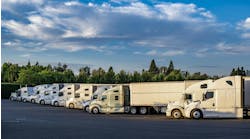Even if you are not directly affected by a natural disaster, Jeremy Robison, president of Tetra Capital, an independent company offering freight bill factoring services, says such events can bring your business to a standstill if there is no freight to haul in your area. In this guest column, Robison shares some fiscal advice for small fleets and owner-operators in terms of planning for the extreme freight conditions natural disasters can create.
With the recent headlines about natural disasters our country – Hurricanes Harvey and Irma spring to mind – I can’t help but think about what it means for the trucking industry.
When thinking about those huge storms and the wreckage they’ve left behind, what it brings to the forefront for me is the need to be prepared. For truckers, especially independent operators, “preparedness” means several things:
- First and foremost, financially, you must have savings and access to working capital to help your trucking firm before, during, and after an emergency.
- Ensuring your equipment is running properly so if you need to act quickly you can.
- Having good support, including staff and partners who you can count on in an emergency. This could include a reliable assistant, employees, logistics partner or financial partner.
- Staying current on your workflow and payables is important, so you have the funds you need in the event there is an emergency or natural disaster.
On an owner-operator level, being prepared might mean having cash on hand, heading warnings, keeping fuel in your tanks in case there is a shortage, staying aware of your surroundings, and keeping food and supplies on your truck in case of an emergency.
It might also mean helping your neighbors or friends or hauling supplies or equipment for free since you are trying to help others.
Nearly all of our clients have been impacted by the recent string of natural disasters, including one of our larger ones.
During one of the recent hurricanes, they recalled their entire fleet back to their holding yard to sit out the storm. This situation was somewhat unique because much of their business is local and/or regional.
However, they were able to outlast the storm and still pay their bills and employees because they were prepared.
My hope would be that no one must live through another natural disaster. Unfortunately, this is not something we can control. However, we can control, to some extent, how prepared we are in the face of such events.




